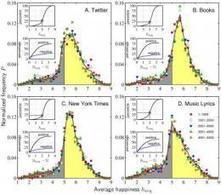The surveyed women spend an average of 81 minutes per day on Facebook, whereas men spend 64 minutes. Low educated groups and low income groups who spend more time on Facebook also report feeling less happy and less content with their lives.
Research and publish the best content.
Get Started for FREE
Sign up with Facebook Sign up with X
I don't have a Facebook or a X account
Already have an account: Login

 Your new post is loading... Your new post is loading...
 Your new post is loading... Your new post is loading...
|
|









![This is your brain on Twitter [VIDEO] | Science News | Scoop.it](https://img.scoop.it/2xUD2GD3cSbeaZ-MlYDLvzl72eJkfbmt4t8yenImKBVvK0kTmF0xjctABnaLJIm9)























